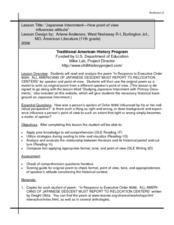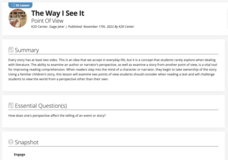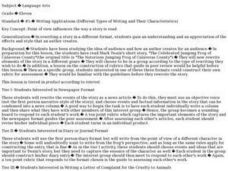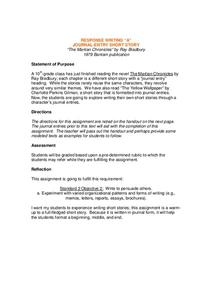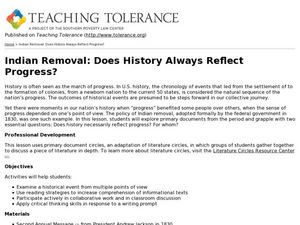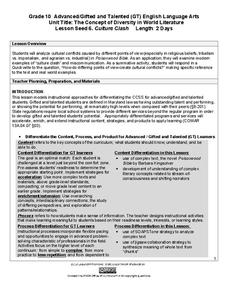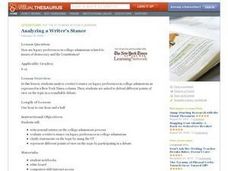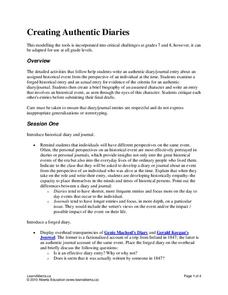Curated OER
Japanese Internment--How Point of View Influences Attitude
How does background and experience influence one's point of view? Dwight Okita's famous poem about the Japanese internment is the text used to explore this essential question. Class members study primary documents to gain the necessary...
K20 LEARN
The Way I See It: Point of View
Robbers see a house from a different perspective than real estate agents. That's the big idea in a lesson about point of view. Groups assume the role of either robbers or real estate agents, note important details in a description of a...
National Endowment for the Humanities
The Metamorphoses and Modern Poetry: A Comparison of Mythic Characters
To gain an appreciation of the power of point of view, class members compare Ovid's version of the myth of "Orpheus and Eurydice" with that used by H.D. in her poem, "Eurydice." Individuals then craft a reflection in which they use...
Simon & Schuster
Curriculum Guide to: Wuthering Heights by Emily Brontë
Eight lessons and worksheets comprise a curriculum guide for Emily Bronte's Wuthering Heights. Class members create a timeline that includes world-historical events as well as events in the novel. They analyze the speaking styles of...
Curated OER
Of Mice and Men: Viewing Guide
In this Of Mice and Men viewing guide worksheet, students study movie terminology as they read brief descriptions and respond to 26 short answer questions as the watch the film based on Steinbeck's novel.
Curated OER
Historical Agency in History Book Sets (HBS)
Study historical events by combining the study of historical fiction and non-fiction. Learners read about true past events in historical fiction novels and then research non-fiction accounts of the same events. What are some differences...
K20 LEARN
You Think You Have Problems: Perspective in Multi-Genre Literature
Young scholars are asked to reflect on how personal experiences might influence points of view and perspectives. They read poems and biographies of the poets and then match the poem to the poet. To justify their matches, learners...
K20 LEARN
Comparing/Contrasting Characters Through Two-Voice Poems: Characterization
Two babies, two fathers, two experiences, two worlds. Partners craft two-voice poems to capture the points of view of two men with very different lives who have just become fathers.
Academy of American Poets
Teaching the Vietnam War with Poetry and Archives
The language of and the perspective of photographs, poems, and official reports differ. After a close reading of two photographs, two poems, and a military report about the Vietnam War, individuals adopt someone's voice or something from...
Curated OER
Writing Applications: Different Types of Writing and Their Characteristics
Twelfth graders rewrite a story in a different format to understand the effects of the author's style. In this writing style lesson, 12th graders read Mark Twain's "The Celebrated Jumping Frog of Calaveras County" and rewrite the...
Novelinks
The Martian Chronicles: Response Writing
Follow the format of Ray Bradbury's The Martian Chronicles with a journal-writing activity. Readers choose a character and examine the character's life and circumstances through brainstorming, research, and discussion before writing a...
Curated OER
Indian Removal: Does History Always Reflect progress?
Students explore the idea that progress for some might not mean progress for all. In this Native American lesson, students recognize different viewpoints about historical events through the study of primary documents. Students decipher...
Curated OER
Hawthorne: Author and Narrator
Students read various pieces of literature by Nathaniel Hawthorne to recognize the difference between a narrator and author. Students in small groups report on the narrative point of view represented in a story they have read.
Library of Congress
Uncle Tom’s Cabin and the Fugitive Slave Act
From the time of its publication, Uncle Tom's Cabin has been controversial. To better understand the debate, class members first examine a broadside decrying the Fugitive Slave Act of 1850, and then two newspaper reviews of the novel...
Maryland Department of Education
The Concept of Diversity in World Literature Lesson 6: Culture Clash
To prepare for a Quickwrite on the question, "How do different points of view create cultural conflicts?" class groups draw examples of religious, cultural, and political conflicts from Things Fall Apart and The Poisonwood Bible to use...
Curated OER
Bronte and Rhys' Portrayal of Bertha
Students, while reading and discussing the two texts by Charlotte Bronte and Jean Rhys, compare/contrast the two main characters and juxtapose them as the same character told from two different points of view. They gain insight of how to...
Curated OER
"Tomorrow and Tomorrow and Tomorrow"
Do you want to live forever? After reading Kurt Vonnegut’s short story, “Tomorrow and Tomorrow and Tomorrow,” class groups adopt the roles of an ethics committee, product manufacturers, concerned scientists, and potential users of an...
Curated OER
Analyzing a Writer's Stance
Should college admissions decisions be based on whether whose family members attended? Secondary students read and respond to a New York Times article on the issue of 'legacy preferences' in college admissions. Following class...
Curated OER
Abigail in Mourning
People deal with grief in different ways. The series of Abigail Adams' letters in this lesson reveals how she dealt with losing her mother, father, and community members. The included worksheet helps young scholars identify the tone and...
Blake Education
Harry Potter and the Philosopher’s Stone
The motto for Hogwarts School of Witchcraft and Wizardry warns that one should never tickle a sleeping dragon, but learners will definitely be tickled by the activities in a packet of materials designed to accompany a reading of the...
Maryland Department of Education
The Concept of Diversity in World Literature Lesson 9: Debating Imperialism
To gain an understanding of Imperialism, class members read Rudyard Kipling's poem, "The White Man's Burden" and Mark Twain's essay, "To the Person Sitting in Darkness." Groups compare these perceptions of non-white cultures with the...
Maryland Department of Education
The Concept of Diversity in World Literature Lesson 12: Author's Purpose - Yeats and Achebe
Is there such a thing as fate/luck? Can one fight destiny? As part of their study of Chinua Achebe's purpose in writing Things Fall Apart, class members answer these questions from Achebe's point of view and then from William Butler...
Alberta Learning
Creating Authentic Diaries
Napoleon Bonaparte once said, "What is history but a fable agreed upon?" A series of lessons encourages learners to look beyond the basic fable agreed upon related to events in history and consider multiple accounts of the event. The...
Independence Public Library
Unmasking the Truth Behind the Red Death
"The Masque of the Red Death" provides readers with an opportunity to research and plan a presentation about a topic related to Edgar Allen Poe's classic short story.


